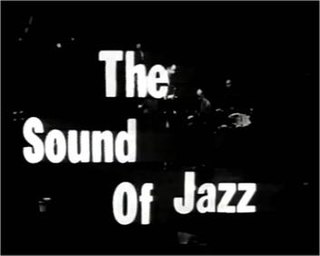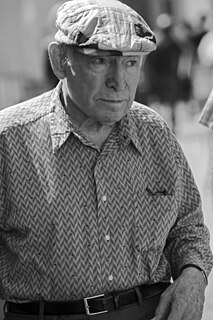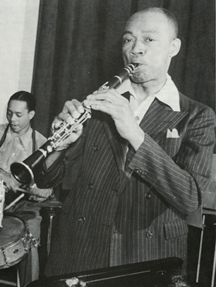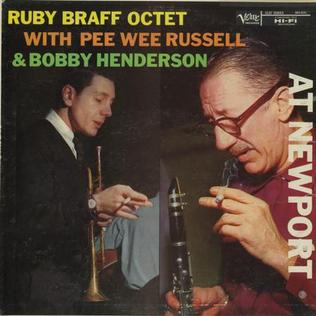
Albert Edwin Condon was an American jazz banjoist, guitarist, and bandleader. A leading figure in Chicago jazz, he also played piano and sang.

Charles Ellsworth "Pee Wee" Russell, was an American jazz musician. Early in his career he played clarinet and saxophones, but he eventually focused solely on clarinet.
Marshall Richard Brown was an American jazz valve trombonist and teacher.

"The Sound of Jazz" is a 1957 edition of the CBS television series The Seven Lively Arts and was one of the first major programs featuring jazz to air on American network television.
Reuben "Ruby" Braff was an American jazz trumpeter and cornetist. Jack Teagarden was once asked about him on the Garry Moore television show and described Ruby as "the Ivy League Louis Armstrong".
Benjamin "Buzzy" Drootin was an American jazz drummer.

Wilbur Dorsey "Buck" Clayton was an American jazz trumpeter who was a member of Count Basie's orchestra. His principal influence was Louis Armstrong, first hearing the record "Confessin' That I Love You" as he passed by a shop window.

Lawrence "Bud" Freeman was an American jazz musician, bandleader, and composer, known mainly for playing tenor saxophone, but also the clarinet.

George Wein was an American jazz promoter, pianist, and producer. He was the founder of the Newport Jazz Festival, which is held every summer in Newport, Rhode Island. He also co-founded the Newport Folk Festival with Pete Seeger and Theodore Bikel and was instrumental in the founding of the New Orleans Jazz and Heritage Festival.
Victor Dickenson was an American jazz trombonist. His career began in the 1920s and continued through musical partnerships with Count Basie (1940–41), Sidney Bechet (1941), and Earl Hines.

Edmond Hall was an American jazz clarinetist and bandleader. Over his career, Hall worked extensively with many leading performers as both a sideman and bandleader and is possibly best known for the 1941 chamber jazz song "Profoundly Blue".
James "Osie" Johnson was a jazz drummer, arranger and singer.
Charles Coleridge "Red" Richards was an American jazz pianist.
Steve Philip Jordan was an American jazz guitarist.
This is the discography for jazz record label Prestige Records. Not all original releases are included. Others are listed by the Jazz Discography Project. The earlier New Jazz/Prestige 78rpm releases and the 100/200 series, are omitted. Prestige also released albums on several subsidiary labels including the New Jazz, Bluesville, Moodsville and Swingsville labels.

George Wein & the Newport All-Stars is an album by the American jazz pianist and entrepreneur George Wein featuring performances recorded in 1962 for the Impulse! label.

The Ruby Braff Octet with Pee Wee Russell & Bobby Henderson at Newport is a live album by Ruby Braff's Octet with Pee Wee Russell and solo pianist Bobby Henderson recorded at the Newport Jazz Festival in 1957 and released on the Verve label.

Swingin' with Pee Wee is an album by clarinetist Pee Wee Russell with trumpeter Buck Clayton which was recorded in 1960 and released on the Swingville label.

Things Ain't What They Used to Be is an album by the First Annual Prestige Swing Festival featuring two all-star groups, one including Coleman Hawkins, Hilton Jefferson, Jimmy Hamilton and Joe Newman and the other led by Al Sears with Buddy Tate, Pee Wee Russell and Joe Thomas which was recorded in 1961 and first released on the Swingville label as a double album before being reissued as two single discs with Hawkins name prominently displayed; Things Ain't What They Used to Be and Years Ago. All tracks were also reissued as Jam Session in Swingville which was credited to Hawkins and Russell.
Manchester Sports Guild (MSG) was a jazz and folk music venue in Manchester, England, that flourished from 1961 to 1973.











